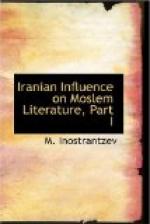[Footnote 1: Note that Dinawari had obviously before him Iranian traditional materials for his history.]
DINAWARI TREATS OF THE FOLLOWING IRANIAN SUBJECTS IN HIS CLEAR AND SUCCINCT FASHION.
The reign of Baywarasaf, Farasiyab; Dhahak, the end of the reign of Minosher and the beginning of the reign of Farasiyab, the reign of Zab son of Budkan and Kaykohad Zab; the reign of Kaykawuys son of Kaykobad, the reign of Kai Khosro, the reign of Lohrasf and the invasion of Bukht Nasar; the reign of Bhishtasb in Persia; the call of Zaradusht, the reign of Bahman Ibn Isfandiyar in Persia and the emancipation of the Jews, the reign of Khumani (Humay) the queen of Bahman; the reign of Dara Ibn Bahman; the war of Dara with Greece; the reign of Darayush; the origin of Alexander; the invasion of Alexander against Dara; the reign of Ardwan; One para. is devoted to the Muluk ut Tawaef, and then regularly follow all the Sasanian kings beginning with Shahan Shah Ardeshir.
IBN AL ATHIR
(Vol. I., PAGE 110 CAIRO EDITION.)
Account of King Loharasp and his son Bishtasb and the appearance of Zaradusht.
[Sidenote: Zend and Pazend.]
And we have related that Kai Khosrou, when he was at the point of death, bequeathed the crown to the son of his uncle Loharasp; and when he acquired the sovereignty he got possession of the throne of gold adorned with jewels. For him was built in Khorasan the city of Balkh which was called Husna (charming). He established archives and strengthened the empire by the selection of soldiers and by advancing agriculture. He took taxes for the purpose of wages for his soldiers. At that time the Turks were in great strength and he went down to Balkh to fight them, and he was a favourite with his people and strong in overpowering his vigourous enemies, kind to his well-wishers, and of great intrepidity. He raised great buildings and cut a number of canals, built cities. The kings of India and China and the occident used to pay tribute to him and addressed him in their despatches as their ‘Lord’ out of fear and respect for him. Subsequently he abdicated the empire and throne and engaged himself in devotion, appointing in succession to him his son Bishtasb to be king. And his reign endured for 120 years. After him Bishtasb became king and in his days appeared Zaradusht son of Sakiman [it should be Safiman, the difference being only that of a dot] who claimed to prophesy and the Magians followed him. And according to what is stated by writers, Zaradusht belonged to Palestine and was a personal servant to one of the disciples of Armaya, the prophet. He was unfaithful to him and told him a lie so that God cursed him and he was afflicted with leprosy and went away to the country of Azarbayjan and there started the religion of Magians. And it is also stated by others that he was a Persian and that he composed a Book and went about with it




